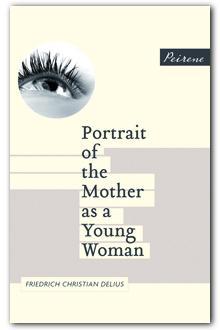Portrait of the Mother as a Young Woman is the third and final book in the Peirene Press series entitled Female Voices. It's an unusually structured book that takes the reader into the mind of Margarethe, a twenty-one year old German woman living in Rome in 1943, who is walking from the boarding house where she lives to a Bach concert being held at the church on Via Sicilia. Having followed her husband to Rome only to see him shipped off to Africa to help the war effort, Margarethe is alone and eight months pregnant. She speaks little Italian and is both mystified by and scared of Rome, the city of their Italian allies. As we follow Margarethe on her walk, we get an insight into her thought processes and get to see World War Two through a new lens.
I liked this book. I found the structure difficult at first; the book is basically one long sentence with no full stops or page breaks and this was challenging for me. I didn't know when to put the book down and the lack of punctuation made the novella feel longer than it was. The pace was also fairly slow towards the beginning and these two factors combined made reading heavy going initially. But as soon as I settled into the book and saw it for what it was, a character driven novel, I started to enjoy it. The pace is slow but this allows the character to get really under your skin and this is how Portrait of the Mother is effective.
I had mixed feelings about the main character, Margarethe. She was expertly written and I'm in awe at how the male author managed to get so into the mind of a young, pregnant woman. On the one hand I couldn't help but empathise with her situation, alone and unsure in a foreign city, struggling to keep her composure. I admired how she constantly battled to remain positive, to appreciate all she had rather than give in to fear, because I don't know if I could do the same. You can't help but feel sorry for her when you read about her wishing that her husband's leg wound would worsen so he could have treatment at a Roman hospital and they could be reunited. But at the same time, I found her very naive. To protect herself she has drawn a shell around herself and tries not to think of politics and the war. Although she never articulates it fully, her views from her time in the Hitler Youth contradict with her religious views and she has severe doubts about the directions Hitler is taking. But she does nothing, she has completely detached herself;
"Even in Germany she had not read the papers, it was better not to know too much, not to say too much, not to ask too much, as one always heard bad news soon enough."
There must have been many people like Margarethe but this side of her made me have very mixed feelings towards her. I suspect this is what Delius intended and that this is part of what makes the book so effective, but it challenges you as a reader. To empathise and not at the same time. After finishing this book, I'm still not quite sure what I think about the main character.
Portrait of the Mother as a Young Woman is the Peirene book that I've found the hardest going so far, mainly because of the structure. It's without a doubt beautifully written and thought-provoking but I don't know if I would describe reading it as an enjoyable experience.
Source: From the publisher, in exchange for an honest review.
First Published in the UK: 2010
First Published in Germany: 2006
Score: 3 out of 5

What an interesting character. It's also interesting that you don't know what to make of the main character at the end of the book. Double and mixed feelings. Was this the purpose of the book?
ReplyDeleteI'm not sure - I think the author meant to portray a complex character but I know others have reacted differently to me towards her.
DeleteI've read other reviews of this and I think most people have had trouble with the structure. I know I would! That would, unfortunately, make me very reluctant to read it, though it does sound compelling.
ReplyDeleteI felt a bit like an unsophisticated reader, having trouble with the structure! The story was compelling.
DeleteThis sounds incredibly fascinating, but I'm just not sure I could deal with a one sentence novella!
ReplyDeleteI did get used to it after a while, but it was quite an adjustment!
DeleteHi Sam, just seen your comment - no idea why that's happening! :/ Will send across some questions tmrw evening x
ReplyDeleteThis one is easily my favourite of the Peirene books I've read so far (7 of the 9, I believe). It just works on so many levels, a story of a young woman but also a picture of the influence of the Nazi regime. The sentence is a bit of a gimmick, but the novella as a whole is brilliant :)
ReplyDeleteIf you're interested, my review is here:
http://tonysreadinglist.blogspot.com.au/2011/06/literary-giveaway-blog-hop-mother-of.html